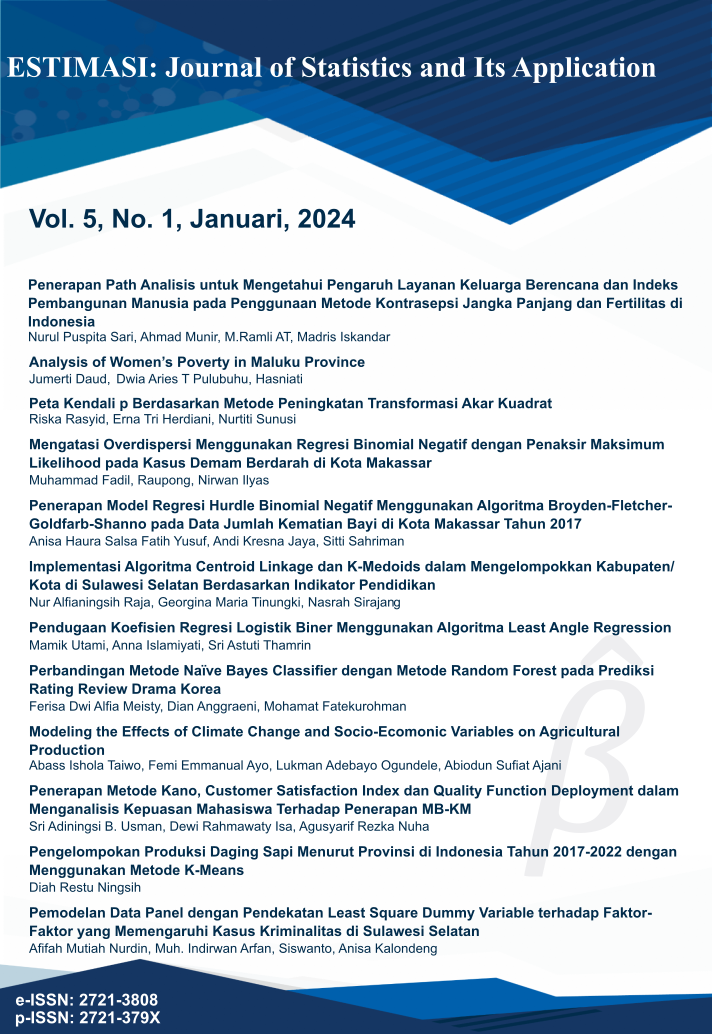Pemodelan Data Panel dengan Pendekatan Least Square Dummy Variable terhadap Faktor-Faktor yang Memengaruhi Kasus Kriminalitas di Sulawesi Selatan
DOI:
https://doi.org/10.20956/ejsa.v5i1.32128Keywords:
Fixed Effect Model, Crime Rate, Least Square Dummy Variable, Panel Data RegressionAbstract
Crime is one of the challenges that often arises in the community environment. In the years 2020-2022, South Sulawesi ranked fourth with the highest reported crime cases in Indonesia. To avoid an increase in the crime rate, an understanding of the factors impacting these cases is necessary. This research aims to determine the fixed effect model with the Least Square Dummy Variable approach to examine the percentage of the poor population, income inequality, population density, and the total population's influence on crime cases in South Sulawesi during the years 2020-2022. The most suitable model is the Least Square Dummy Variable using an individual effect with an analysis result of of 99.9%. The variables of the percentage of the poor population, population density, and the total population are proven to significantly influence crime cases in South Sulawesi.
References
Nur, M. T., Khoirotunnisa, D., Widyaningsih, W., & Nohe, D. A. Regresi Data Panel untuk Memodelkan Persentase Kemiskinan di Kalimantan Timur. Prosiding Seminar Nasional Matematika, Statistika, dan Aplikasinya, 2022.
Kosmaryati, Handayani, C. A., Isfahani, R. N., & Widodo, E. Faktor-Faktor yang Mempengaruhi Kriminalitas di Indonesia Tahun 2011-2016 dengan Regresi Data Panel. Indonesian Journal of Applied Statistics, 2(1), 10–20, 2019.
Nurwahyuni, N. I., Baskara, Z. W., & Purnamasari, N. A. Model Regresi Data Panel pada Tingkat Kriminalitas di Provinsi Nusa Tenggara Barat dengan Menggunakan Fixed Effect Model. VARIANCE: Journal of Statistics and Its Applications, 5(2), 169–184, 2023.
BPS. Badan Pusat Statistik. Diakses: 26 November 2023. [Daring]. Tersedia pada: https://www.bps.go.id/
Febrianti, E., Susetyo, B., & Silvianti, P. Pemodelan Tingkat Kriminalitas di Indonesia Menggunakan Analisis Geographically Weighted Panel Regression. Xplore: Journal of Statistics, 12(1), 91–109, 2023.
Desinta, D. Faktor-Faktor yang Mempengaruhi Kejadian Kejahatan di Provinsi Jawa Barat Tahun 2018-2020. MEDIAN: Jurnal Ilmiah Populer, 5(1), 20–29, 2022.
Alwi, W., Rayyan, I., & Nurfadilah. Analisis Regresi Data Panel pada Faktor-Faktor yang Mempengaruhi Tingkat Kemiskinan Provinsi Sulawesi Selatan Tahun 2011-2015. Jurnal MSA, 6(2), 2018.
BPS. Badan Pusat Statistik Provinsi Sulawesi Selatan. Diakses: 28 Oktober 2023. [Daring]. Tersedia pada: https://sulsel.bps.go.id/
Astuti, T. D., Maruddani, D. A. I. Analisis Data Panel untuk Menguji Pengaruh Risiko terhadap Return Saham Sektor Farmasi dengan Least Square Dummy Variable. Media Statistika, 2(2), 71–80, 2009.
Indrasetianingsih, A., & Wasik, T. K. Model Regresi Data Panel untuk Mengetahui Faktor yang Mempengaruhi Tingkat Kemiskinan di Pulau Madura. Jurnal Gaussian, 9(3), 355–363, 2020.
Mobonggi, I. D., Achmad, N., Resmawan, & Hasan, I. K. Analisis Regresi Data Panel dengan Pendekatan Common Effect Model dan Fixed Effect Model pada Kasus Produksi Tanaman Jagung. INTERVAL: Jurnal Ilmiah Matematika, 2(2), 52–67, 2022.
Yulianto, S., & Kurniawan, D. A. Regresi Panel Tingkat Pengangguran Terbuka Kabupaten/Kota Provinsi Nusa Tenggara Barat. VARIANCE: Journal of Statistics and Its Applications, 3(1), 29–36, 2022.
Rahmadeni, & Yonesta, E. Analisis Regresi Data Panel pada Pemodelan Produksi Panen Kelapa Sawit di Kebun Sawit Plasma Kampung Buatan Baru. Jurnal Sains Matematika dan Statistik, 2(1), 2016.
Basuki, A. T., & Prawoto, N. Analisis Regresi dalam Penelitian Ekonomi dan Bisnis. Depok: Rajawali Pers, 2015.
Sutikno, B., Faruk, A., & Dwipurwani, O. Penerapan Regresi Data Panel Komponen Satu Arah untuk Menentukan Faktor-Faktor yang Mempengaruhi Indeks Pembangunan Manusia. Jurnal Matematika Integratif, 13(1), 1–10, 2017.
Alviani, L. O., Kurniati, E., & Badruzzaman, F. H. Penggunaan Regresi Data Panel pada Analisis Indeks Pembangunan Manusia. Jurnal Riset Matematika, 1(2), 99–108, 2021.
Downloads
Published
Issue
Section
License
Copyright
It is the author's responsibility to ensure that his or her submitted work does not infringe any existing copyright. Authors should obtain permission to reproduce or adapt copyrighted material and provide evidence of approval upon submitting the final version of a manuscript.


